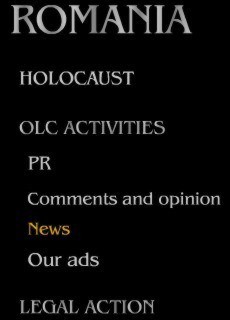DAN
SOVA, a spokesman for Romania's opposition Social Democratic
Party (PSD), is paying the price for his poor grasp of history.
On March 5th, discussing the Holocaust live on television,
he said: "On the territory of Romania, no Jew suffered".
He added that "24 Jews died" as a result of the
notorious government-backed Iasi pogrom of 1941. Most historians
put the figure at 12,000 or more.
It didn't take long for Mr Sova to feel the consequences.
The PSD distanced itself from his comments, removed him from
his post and dispatched him to the Holocaust Memorial Museum
in Washington, DC. Yet Mr Sova's views are hardly unique
in Romania. Any newspaper kiosk is full of books and other
publications that echo his pronouncements.
Education is partly to blame. The Holocaust wasn’t
part of Romania's school curriculum until 1998, and until
2004 many textbooks followed the communist line that the
killings were something that happened somewhere else. In
2004 the state-backed Wiesel Commission issued a report on
the Holocaust, leading to an official acknowledgement that
killings and deportations took place on Romanian territory.
Since 2005 secondary-school students have been able to take
a special Holocaust course.
Yet no history faculty at Romanian universities offers a
course on the Holocaust, notes Felicia Waldman, a professor
at the University of Bucharest’s Goldstein-Goren Hebrew
Studies Centre. And so many history teachers graduate ill-equipped
to teach the subject.
More worryingly, history is often taught with the nationalist
assumptions that held sway before the overthrow of communism.
Romanian children are, for example, still taught that they
are the direct descendants of the Romans and Dacians, an
approach some historians see as simplistic.
“The history that is taught is of the Romanian people,
not of Romania itself,” says Ms Waldman. "Students
are still taught about how hospitable the Romanian people
have always been, and how they’ve been the victims
of history, never acting as aggressors." Young and old
people alike believe that Ion Antonescu, the pro-Nazi wartime
dictator, was a "friend of the Jews".
The Centre for Monitoring and Combating Anti-Semitism in
Romania (MCA) estimates that 270,000 Romanian Jews and 36,000
Romanies (Gypsies) were exterminated under Antonescu. There
are believed to be fewer than 9,000 Jews in Romania today.
Mr Sova issued a statement in which he said he regretted
that his words had been misunderstood. But he failed to apologise
for the content of his declarations. Now the MCA and Romani
CRISS, a pro-Roma NGO, have filed a criminal complaint against
him. Since 2002 Holocaust denial has been a criminal offence
in Romania, punishable by up to five years in prison.
But the chances of prosecution are slim. The law has been
repeatedly flouted. Earlier governments have set poor examples.
In 2003, the public information ministry stated: "We
firmly claim that within the borders of Romania between 1940
and 1945 there was no Holocaust." (It retracted the
claim a week later.)
Mr Sova's dismissal may indicate that the situation has
improved since then—although some think he will get
his old job back after his pilgrimage to Washington. Romania
has some way to go in facing up to its wartime past, and
a change to the way history is taught might be a good place
to start.
economist.com
|


